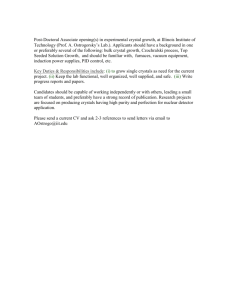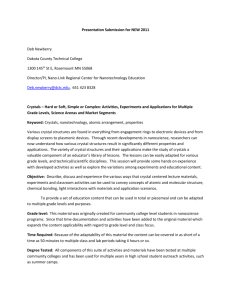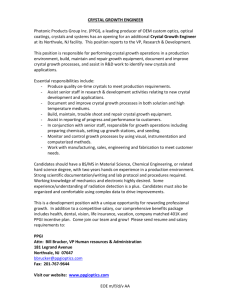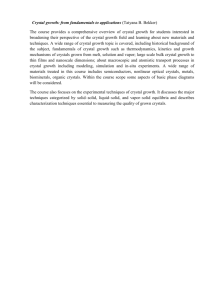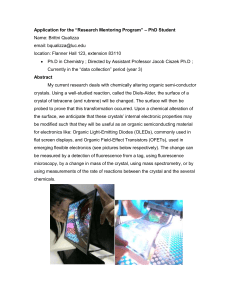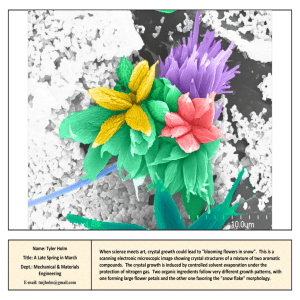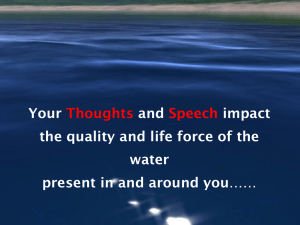Whitney - Symposium presentation
advertisement
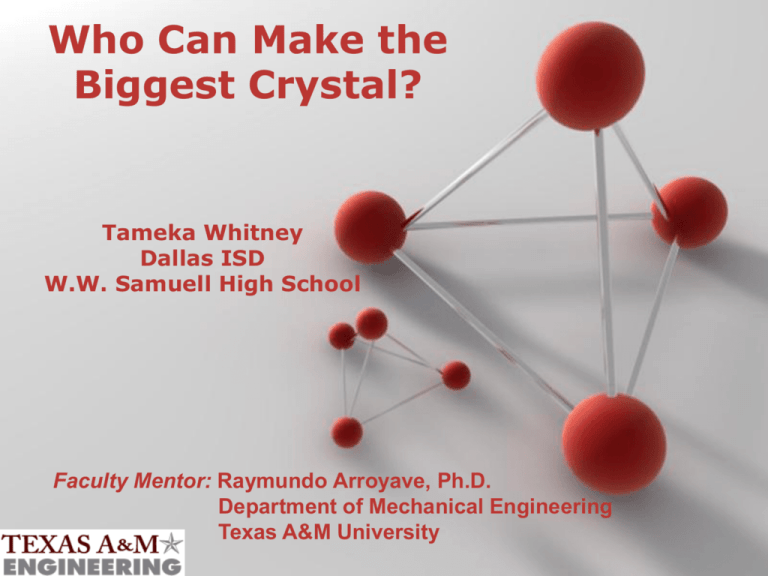
Who Can Make the Biggest Crystal? Tameka Whitney Dallas ISD W.W. Samuell High School Faculty Mentor: Raymundo Arroyave, Ph.D. Department of Mechanical Engineering Texas A&M University Page 1 Why is Computational Materials Science important? • Provides the “recipe” for creating and testing a substance without using experimentation • Simulates structural, mechanical & thermal properties Page 2 Where do I fit in? My role is to generate data based on the structural properties of copper-tin alloys that may be used in the soldering process Page 3 My E3 Experience Diagrams of crystalline structures were generated from data obtained through simulations. Crystal structure of Copper Copper unit cell Charge Density Diagram Page 4 Crystal Structures Diamond Graphite Crystal structures aid in understanding the properties of substances. Page 5 The Connection… Allow students to create their own crystals to study the structure and properties of the crystals that are formed as a result of the different types of bonding Epson Salt Borax Alum Page 6 TAKS Objective & Related TEKS Objective 1 Nature of Science TEKS 2E, F, H and I -- uses scientific methods to solve investigative questions TEKS 3E -- uses critical thinking, scientific reasoning, and problem solving to make informed decisions Page 7 TAKS Objective & Related TEKS Objective 4 Chemistry TEKS 7D -- how atoms form ionic, metallic, and covalent bonds Page 8 Identify Problem Brainstorm Design Process Design Build Redesign Test & Evaluate Share Solution Page 9 Pre-AP Chemistry Project • Who can create the largest crystal? • Web Quest • “Purchase” materials ($50 budget) • Create a brochure advertising their “recipe” • Gallery Walk (Chemistry Classes) Page 10 Day 1 • Pre-Test (possibly given at an earlier time) • Review types of bonding and introduce crystals • Announce project • Assign groups (3-4 students) Page 11 Day 2 • Internet search for information on project (Web Quest) --how to grow crystals --substances that may be used --how growth rate is affected by external stimuli (e.g., temperature, amount of light, etc.) • Create a procedure for growing a crystal Page 12 Day 3 • Purchase materials • Perform experimentation procedures and begin growing crystals • Begin making brochure Page 13 Day 4 • Make observations, record data and make adjustments if necessary • Complete brochure Page 14 Day 5 • Brochure and Crystal due • Accountable Talk/Wrap-up • Post-Test Page 15 Gallery Walk Students from Chemistry classes will view and score crystals using specific criteria such as: »Clarity of crystal-making instructions »Size of crystal »Creativity Page 16 Sample Price List for Crystal Supplies Item Price/Unit Cup of solute $1 Popsicle sticks (set of 2) Pipe Cleaners (set of 3) Use of water bath, dry ice or fridge Mason Jar $1 Plastic Cup $1 Food Coloring $1 $1 $5 $5 Page 17 Sample Question The reason salt crystals, such as KCl, hold together so well is because the cations are strongly attracted to A. neighboring cations. B. the protons in the neighboring nucleus. C. free electrons in the crystals. D. neighboring anions. Page 18 Special Thanks • • • • • E3 Team Dr. Raymundo Arroyave Min Soo Park Anchelee Junkaew National Science Foundation (NSF) • Nuclear Power Institute (NPI) • Texas Workforce Commission (TWC) • Chevron Page 19 Resources • K. Momma and F. Izumi, "VESTA: a three-dimensional visualization system for electronic and structural analysis," J. Appl. Crystallogr., 41:653-658, 2008 • www.tamu.edu • www.well.ox.ac.uk/kitchen.shtml • www.ehow.com/how_4828964_own-alum-crystals.html • azareal.wordpress.com/ • www.wgbh.org • www.nysedregents.org/ Page 20
